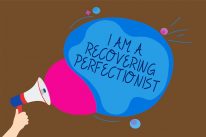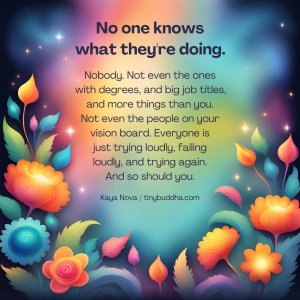
“There is a kind of beauty in imperfection.” ~Conrad Hall
Back when I was a teenager, I was kind of a perfectionist. Or, well, I wasn’t really a perfectionist—I was actually a “fake” perfectionist.
Allow me to explain: I put on the perfectionist persona. I acted and behaved in a certain way so that everyone (including both my fellow classmates and teachers) thought and believed that I was the perfect student when I wasn’t.
Everybody thought I was the student who got straight A’s, was a bookworm, was involved in every extracurricular activity that ever existed, never got in trouble in school for anything ever, and was an overall stellar student.
Though some of those things were kind of true—I mean, I was involved in a lot of activities and I never did get a detention ever—I was very far from a stellar student.
I didn’t get A’s in middle and high school; I mostly got C’s. I certainly wasn’t a bookworm; I hated reading all this fiction stuff I was told to write book reports on.
The truth of it all was that I was really stellar at one thing: faking my own perfection. I had mastered the skill of being seen as the perfect, most stellar student in order to hide my own shortcomings.
I was trying to hide that I wasn’t so great at studying and getting good grades. I was trying to hide that I did, in fact, get in trouble every so often.
I was trying to hide my own imperfections. I was terrified that the world would see that I had weaknesses and inner wounds. I feared that others would know that there were tasks that I was not good at or just flat-out could not do.
To this day, the fear of others seeing my imperfections is still an issue to some extent. Like the fear of judgment that comes up whenever I make a typo in an article or whenever I give a presentation and accidentally mispronounce a word.
My inner critic still likes to creep in and try to debilitate me from moving forward.
Whether we are a child trying to avoid bad grades or an adult who is trying to write the perfect book, we are all struggling with accepting our own imperfections.
We are all on the journey of hindering the voice of our inner critic and allowing our true selves (imperfections and all) to be seen.
Here are three ways that can help you create a habit of accepting your own imperfections:
1. Focus on utilizing your strengths, not your weaknesses.
Many of us grew up societies where we were told we have to really focus on strengthening our weaknesses. If we weren’t great at math, then we got the idea that we needed to spend more of our time and energy strengthening our abilities in math.
Though there are benefits to strengthening our weaknesses, it can really cause a blow to our self-esteem and motivation to focus on them. We can develop the idea that just because we are not good at this one thing, then we are a failure.
So ask yourself: What things am I really good at? Is it music? Languages? Writing? Speaking? Physics? Identify what things come natural to you and make it a goal to really enhance your gifts so you can be the best that you can be.
2. When you mess up, say to yourself, “I am beautiful!” Then write down all the ways that you are beautiful.
Let’s get real here: Whether you are doing something that is your strength or your weakness, at some point or another you are going to mess up.
The problem, however, is that when we do mess up, many of us shut down. We stop trying, and our inner critic starts telling us how we are not good enough.
Next time you mess up when you’re doing something, say out loud, “I am beautiful!” Then get out a sheet of paper and write down ways that you are beautiful. What are the good things that you do for others? What are the amazingly beautiful qualities that you have?
To enhance this even more, make it a habit to do this same thing when someone else messes up. See someone trip over their words during a speech? Remind yourself that they are beautiful, and why. See someone make a typo? Remind yourself that they are beautiful, and then write down a quality that they possess that makes them so beautiful.
We are all connected, so by sending other people love when they expose their own imperfections, we will give ourselves space to heal as well.
3. When you mess up, just keep going.
For many of us, the problem is that when we mess up, we just stop working. We get so caught up in the belief of “I am not good enough” that we stop ourselves from moving forward.
I struggled with this constantly when I took my very first watercolor painting class two years ago while I was living in Korea. Over and over again I found myself making a small error, getting all worked up about it, shutting down, and basically just wanting my art teacher to do it for me.
Over time I gradually learned to just let it go and keep going. I ultimately developed and strengthened my skills by setting the intention to keep going regardless of any errors I made along the way.
So, whenever you do mess up, whether that be using the wrong brush for that one stroke, saying the wrong thing, losing something important, or tripping over your own two feet, just brush it off and keep on going.
Breaking down, stopping, and worrying about it doesn’t allow us heal and transform. Accepting the mistake and continuing to act does!
Happy woman image via Shutterstock
About Jennifer Twardowski
Jennifer is a self and relationship coach and teacher. She is the founder of jennifertwardowski.com where she helps women create fulfilling relationships andlives by reconnecting with their true heart’s desires. Grab a copy of her Self and Relationship Healing Meditation and follow her on Facebook and Twitter.













 Though I run this site, it is not mine. It's ours. It's not about me. It's about us. Your stories and your wisdom are just as meaningful as mine.
Though I run this site, it is not mine. It's ours. It's not about me. It's about us. Your stories and your wisdom are just as meaningful as mine. 